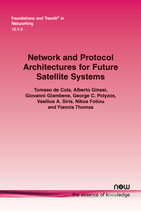Network and Protocol Architectures for Future Satellite Systems
By Tomaso de Cola, German Aerospace Center, Germany, tomaso.decola@dlr.de | Alberto Ginesi, European Space Agency, France, alberto.ginesi@esa.int | Giovanni Giambene, University of Siena, Italy, giambene@unisi.it | George C. Polyzos, Athens University of Economics and Business, Greece, polyzos@aueb.gr | Vasilios A. Siris, Athens University of Economics and Business, Greece, vsiris@aueb.gr | Nikos Fotiou, Athens University of Economics and Business, Greece, fotiou@aueb.gr | Yiannis Thomas, Athens University of Economics and Business, Greece, thomasi@aueb.gr
Abstract
Since their conception, satellite communications have been regarded as a promising tool for all environments where the terrestrial infrastructure is limited in capacity or to take advantage of the multicasting/broadcasting capabilities inherent in satellite technology. Recent advances have seen satellite technology mature to a more prominent role in the telecommunications domain. In particular, the design of novel satellite payload concepts for Geostationary (GEO) satellite platforms, as well as renewed interest in Low Earth Orbit (LEO) satellite constellations have made the integration of satellite and terrestrial networks almost compulsory to ensure new services meet the requirements for high user-rate and quality of experience that could not be achieved using either of the two technologies independently. From this viewpoint, convergence of satellite and terrestrial technologies also requires considering the most recent trends in networking, with special attention being paid to the potential new architectures that have been recently proposed in the framework of Future Internet. This monograph explores the main components of the scenarios above, putting particular emphasis on the networking aspects. To this end, novel protocols such as Multi Path TCP (MPTCP) and networking trends such as Information Centric Networking (ICN) are explored by demonstrating their applicability in some scenarios that deploy both satellite and terrestrial segments. Particular attention is given to smart gateway diversity schemes which advocate the use of sophisticated multi-path transmission schemes to exploit the multi-homing features offered by present day devices. The second part of the monograph is dedicated to content-based networking, which is becoming increasingly popular driven by the pervasiveness of the Internet in everyday life. In this regard, applications to satellite communications are illustrated and the technical challenges to be further addressed are highlighted.
Network and Protocol Architectures for Future Satellite Systems
Since their conception satellites have offered the promise of more capacity for terrestrial communication systems or to exploit their inherent multicasting and broadcasting capabilities. Recent advances in satellite technology have resulted in the integration of satellite and terrestrial networks to meet the quality and capacity requirements of modern day communication systems.
Network and Protocol Architectures for Future Satellite Systems reviews the emerging technologies being deployed in the networking architectures being proposed in the framework of the Future Internet. Novel protocols such as Multi Path TCP (MPTCP) and networking trends such as Information Centric Networking (ICN) are described in depth and their application in segments deploying both satellite and terrestrial networks are illustrated.
This is also the first monograph to review content-based networking extensively. This is becoming increasingly important driven by the ubiquitous nature of the internet. Applications to satellite communications are illustrated and the technical challenges to be further addressed are highlighted.
